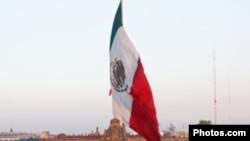Mexico faces multiple crossroads, said U.S. Ambassador to Mexico Carlos Pascual in a lecture recently given at Stanford University. Mexico's economic potential is huge, but so are its challenges.
"Sixteen years after it was signed," Ambassador Pascual noted, "there is little doubt that NAFTA [North American Free Trade Agreement] has transformed North America and the U.S.-Mexico economic relationship." More than 40 million jobs have been created and annual trade among NAFTA partners now totals $946 billion – more than triple of what it was in 1993. Mexico, said Ambassador Pascual, has low foreign debt, controlled inflation, high international reserves, and sound financial institutions. Mexico today is the number 3 trading partner of the U.S. and is a bigger market for U.S. exports than all of the Asian newly industrialized countries combined.
But there are challenges also – namely, lack of competition within the economy, and 47 million Mexicans, about 44 percent of the population, living in poverty. "Solving these structural problems will require a consensus of political will in Mexico just at the time when presidential politics through 2012 will make such consensus difficult," said Ambassador Pascual. "There is, however, a window of global opportunity that may be unique but may not stay open forever."
Insecurity and violence also pose a challenge to Mexico's present and future. Since President Felipe Calderon took office in December 2006, Ambassador Pascual noted, "he has made clear that combating criminal organizations is his most pressing priority, and his government has acted accordingly." Mexico and the United States have stepped up law enforcement cooperation and Mexican authorities have had unprecedented success in taking down major organized crime leaders. For its part, the U.S. Government recognizes that it must do more to reduce drug demand in the United States.
Ambassador Pascual said, "a key component of our global competitiveness is creating a border that positions Mexico and the United States to compete together in the global market." Better cooperation is needed on production standards, reducing greenhouse gas emissions, and clean energy research and production.
He said, "the Obama Administration has committed itself through the Merida Initiative and other security initiatives ... as well as through our many joint economic initiatives, to support Mexico in its efforts to build institutions, establish a strong rule of law, and to combat organized crime as a necessary step to increasing economic well being."
Mexico's economic potential is huge, but so are its challenges.




